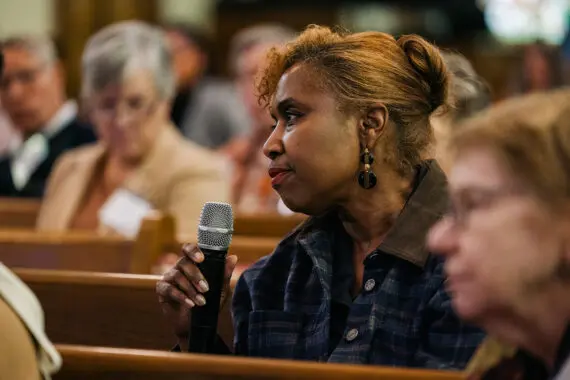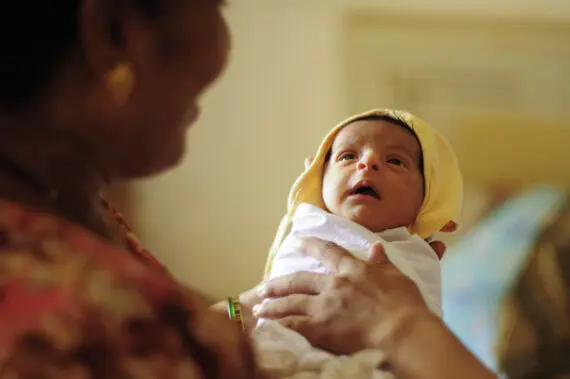Editor’s note: This is the fifth piece in a series that explores gender pay equity as an essential element of ending hunger in the United States. Read earlier pieces: “Reducing U.S. Hunger by Closing the Gender Wage Gap,”“A Closer Look at Gender Pay Inequities,” “Gender Pay Equity Means Faster Progress Toward Ending Hunger,” and “Strengthening Protections Against Gender Pay Inequities.”
As we have explored in this series, gender pay equity is necessary for the United States to end food insecurity and hunger. One among many indications of this is that the national poverty rate among single mothers and their children is higher than 30 percent, and single mothers of color and their children have poverty rates as high as 42.6 percent. The poverty line for one adult and two children in 2024 is just $25,820. Without pay equity, there is far less grocery money.
We also pointed out that although equal pay between women and men has been the law for more than 60 years, the gender pay gap is shrinking extremely slowly. If present trends continue, today’s 25-year-old workers will retire before the country achieves pay equity.
Can we follow in the footsteps of countries that are moving more quickly toward pay equity?
Iceland is at the head of the class—it is currently the only country in the world to have reduced its gender pay gap to less than 10 percent. Iceland has made much faster progress because it has shifted the legal burden of proof. In the United States and most other countries, women must first discover and document that they are being paid less than a male counterpart, and second, prove in court that they are being paid less due to gender discrimination.
In 2018, Iceland changed its approach to instead require employers of more than 25 workers to prove that they are paying women fairly. They must earn a certification from an external reviewer and can be fined for noncompliance.
A writer reported in the Harvard Business Review that previous research, including a study of a voluntary pay equity compliance program in Canada, showed that “equal pay certification schemes are only effective when strongly enforced.”
Provisions of the Paycheck Fairness Act, which as described earlier has been introduced in Congress but has not passed, would move U.S. law a little closer to the Icelandic system. These provisions, for example, prohibit companies from seeking applicants’ past salary histories and from retaliating against workers who file complaints. It seems doubtful, however, that the Icelandic approach as a whole, with its focus on regulations and enforcement of private sector compliance, would be accepted in the United States, with its much larger and more diverse population, severe degree of economic inequality, and, in some parts of the country, a leaning toward libertarianism.
While gender pay equity is very important, the impact of pay discrimination may vary depending on a country’s social support system. While the United States has a social safety net, it is more limited than in many peer countries. Some programs have strict eligibility criteria and may have to function as a “block grant,” meaning that they have a limited amount of funding and their budget is not increased if the needs increase. The United States, unlike most other developed countries, does not require employers to offer paid leave. Moreover, there is a shortage of affordable, accessible childcare for families in most states.
In countries with a stronger social support system, female workers have a more significant financial cushion against the impacts of gender pay discrimination. Two countries with developed economies that are peers of the U.S. offer publicly-funded social supports, particularly for parents and families. In Italy, the Universal Child Allowance (known as the AUU from its Italian acronym) is Italy’s new social welfare program, adopted in 2022. It is not dependent on parents’ income or employment status, but rather, is designed to offer support to all families with children up to age 21. Benefits are available beginning in the seventh month of pregnancy. The law, recognizing that some groups face greater difficulties, also provides for extra benefits for large families, mothers under the age of 21, and children with disabilities. Austria is another country that offers comprehensive child benefits designed to support families with minor children, whether biological, adopted, or fostered. Grandparents may also qualify.
Bread for the World supports a permanent expansion of the Child Tax Credit, which cut the child poverty rate nearly in half for the few months in 2021 that it was in effect. This expansion offers some of the benefits of the child allowances offered by most industrialized nations.
Even without adopting an approach that requires employers to prove that they pay women and men equitably, and even without making major investments in its social safety net, the United States could make progress by strengthening our current laws and safety-net systems.
Michele Learner is managing editor, Policy and Research Institute, with Bread for the World.
Deepen your understanding of hunger’s causes and solutions – join our Institute Insights community and receive free, research-based articles like this one straight to your inbox.



